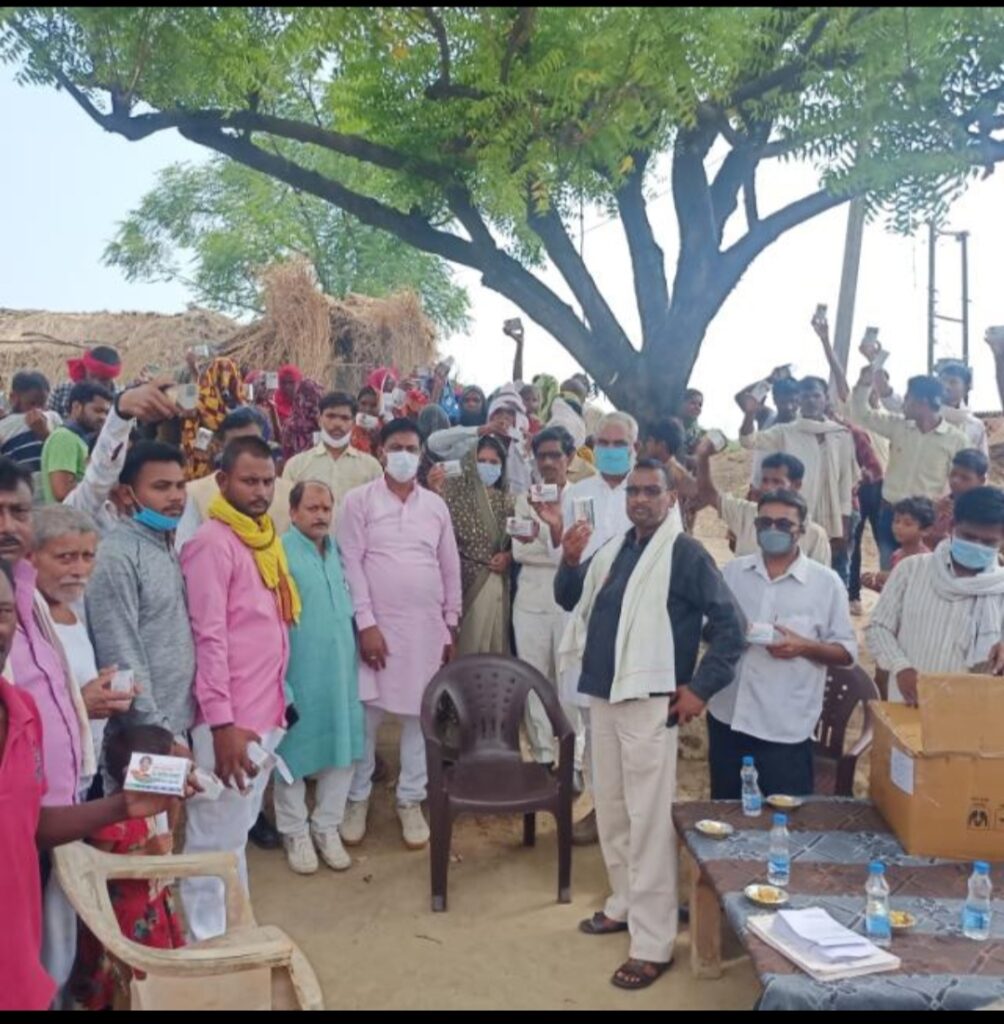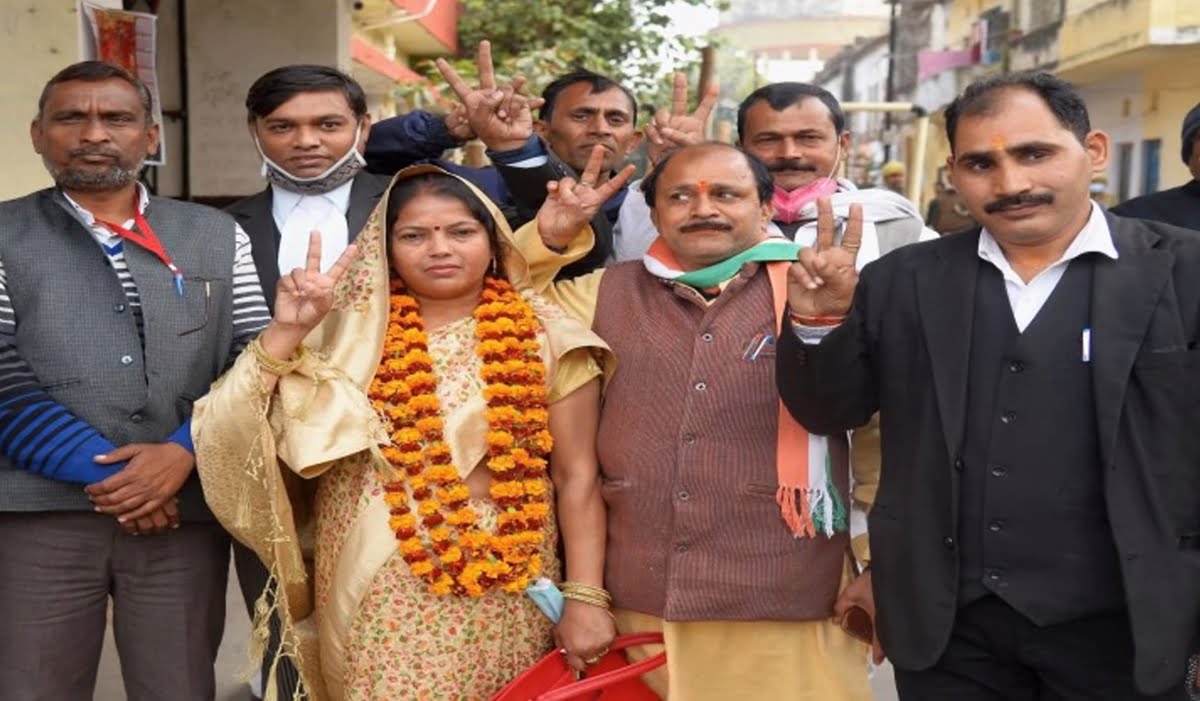Politics is no cakewalk, especially for women. Women find themselves having to prove their capability of leading a constituency, district, state, or country all the more than men. There is an unsaid notion that women in politics are usually the proxies of their husbands or fathers. They are judged from the glasses of either being the puppet of their male counterparts or nasty women who are power hungry. However, when it comes to a woman belonging to marginalised communities, such as say the Scheduled Castes (SC) category, it becomes all the more difficult for them to assert their political identity.
Also read: UP Elections: Congress Candidate Archana Gautam And The Fight For Women’s Sexual Agency In Politics
Uttar Pradesh (UP) elections is currently witnessing Manju Sant fight. Manju Sant is shattering the notions of how men are the puppeteers of women political leaders. Congress launched their campaign in UP called “Ladki hoon, lad sakti hoon”, under which Priyanka Gandhi announced Manju Sant, a candidate from the Bara constituency, Prayagraj. About 40% of seats have been allocated to women candidates by the Congress in the elections. Prayagraj has the highest number of women candidates from Congress i.e. six women on twelve Assembly seats. Manju Sant from Bara is one among them.
Manju Sant has the full support of her mother-in-law and husband, who works in the Allahabad collector office. Sant’s husband has no political background but has been active for community people when needed. For the last 15 years, Manju Sant has been working on the ground. Talking to this reporter, Manju said, “It was surprising to see my name on TV when Priyanka ji announced the candidate’s list, I was unaware about the decision. I feel they saw my work on the field, they saw determination towards people of Bara.”

Manju Sant is a Dalit woman. She has twice won the Zilla Parishad elections, once as a BSP member and the second time as she fought independently. Later, she joined Congress in 2012. Manju Sant as a Congress candidate is now contesting on the Bara seat reserved for a Scheduled Caste candidate. Usually, it is assumed women can only climb up until the position of district panchayat presidents and thereafter to be an MLA or MP, they are at the mercy of party leaders. According to a report by Indiaspend, in Tamil Nadu, a total of 2,77,160 women leaders have held office across all levels of urban and rural governance, yet only a few become MPs or MLAs. As per the 2018 compilation report of the local government directory, elected women representatives were 2,72,733. Currently, there are only 41 women MLAs among total seats of 403 in UP. It is, however, comparatively better than in previous terms.
When women from marginalized sections join politics
Women entering politics from marginalized societies have to carry the burden of intersecting social identities such as gender, caste, ethnicity, religion, and class. Often reservations for minorities tend to result in the election of men while women within these marginalised communities continue to be neglected. Further, reservations for women lead to the election of women from privileged, upper-caste communities. Hence, this leaves no space for marginalized women to represent their community, their problems, challenges, and culture well. “Among marginalized, women are at the utmost receiving end. They are voiceless in the entire process. Women’s problems seem ordinary as they are accepted universally, so they don’t find the necessity of raising them. Even today women leave the house only if their male counterparts accompany them or find work in their vicinity to avoid travelling. Most of them toil as labourers, educated once takes a step further works as a teacher or be part of government schemes”, says Manju Sant.
Women entering politics from marginalized societies have to carry the burden of intersecting social identities such as gender, caste, ethnicity, religion, and class. Often reservations for minorities tend to result in the election of men while women within these marginalised communities continue to be neglected. Further, reservations for women lead to the election of women from privileged, upper-caste communities. Hence, this leaves no space for marginalized women to represent their community, their problems, challenges, and culture well.
People continue to find it unacceptable to see women in positions of power or if those from the historically backward caste communities are the helm of managing the society. Even the contesting women candidates themselves find it challenging to break the stereotypes imposed by the rigid caste system. “If we don’t, the upper-caste society or men from our own community won’t support us. During campaigning, when we visit their areas, we had to touch their feet, show respect, and more,” says one politically active woman (who did not want to be named). As per the data of the Election Commission, during the 2017 Assembly elections, the total voters of Bara are over 3,20,594, Dalits are 18%, Muslims 14%, OBCs 13%, Brahmins 11%, Thakurs 8%, Yadavs 6%, and Pasi 6%.
Why are political parties interested in women?
Women have become the center of political parties’ agendas but they still seem to be seen, more or less, as a vote bank. The number of women coming out to vote in UP is increasing. Over 54 lakh new women voters participated in the voting process in 2017. What is interesting to know is that majority of women are expected to listen to their male elders when it comes to voting. Talking to this reporter, the women in remote areas of Allahabad said, “We will give our vote to whoever our Pradhan asks us to give.”
While Congress launched the Ladki hoon, lad sakti hoon campaign, the BJP and the SP in their manifestos promised free transport and free higher education to women. According to NFHS-5 2021, the literacy rate in UP for women is 66%, and for men to 82%. Though literacy prevails in UP, women in the public sphere is a rare sight to see. After dawn, women hardly travel. In such a scenario, the question one needs to ask is that will free transport be enough to ensure better mobility of women? A resident woman volunteer said, “While campaigning, it is hard to get women out of their homes. Firstly, we need to convince their partners or fathers. If allowed, I have to pick them up and drop them back. So, mostly we make sure to campaign in a particular block and approach women living nearby. Sometimes, they are permitted on the condition that a man from the household will accompany the woman.” The mobility of a woman other than their daily routine is, thus, put in the hands of their male counterparts. Manju Sant affirmingly said, “There is no denying that this exists and this is exactly what I want shattered in Bara. Who knows, my story might be the start of it all. While most men are still suspicious, some of them are coming forward with support to empower their daughter, wife or mother.”

Talking to Manju Sant gives a gist of what it requires to pull off a political career in the state where caste, religion and patriarchal norms play a significant role. She has been active in the field for almost 15 years and knows the problem of Bara well. Her political activism has also shifted attention towards the Mallah community fiasco in Baswar village, where 20 Mallah families’ boats were destroyed.
Also read: Is There Scope For Equitable Representation Of Women Leaders In UP Elections 2022
Like Manju Sant, many women from Scheduled Caste and Scheduled Tribes are working relentlessly to break the glass ceilings in the political arena, for the larger good for their communities.
Featured image source: Amar Ujala





Not a congressman, but her success is important at such time. Equality is a real long run. A well researched and formed summary, thanks.